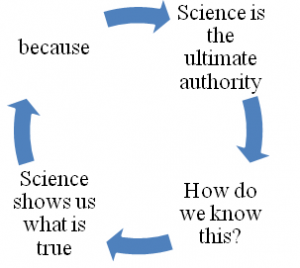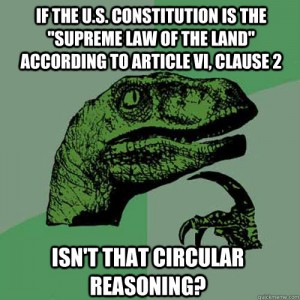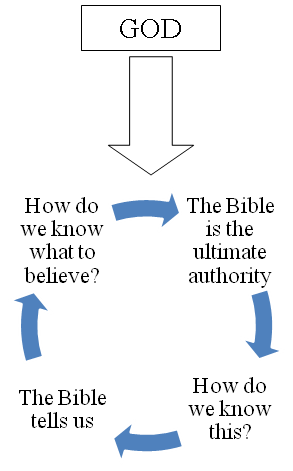Using the Bible to Prove the Bible
Christians are often accused of circular reasoning when they attempt to prove the Bible by citing the Bible. Those who level these accusations say that it is improper to attempt to prove that the Bible is God’s Word by using the Bible as evidence for that. This argument may appear strong at a surface level, but it neglects the real issues involved in epistemology (the study of how we know things).

How do we know anything?
Most people will acknowledge we can prove truth claims by three means:
- Authority
- Rationalism (reason or thought)
- Empiricism (observation or experience)
Which of the three options is most reliable in attempts to prove something? Either someone has the authority to tell us what is true (God), or we logically figure it out (reason with logic), or else we are able to observe or experience it (i.e., observe it through a scientific process).
What most people fail to realize is that in questions of ultimate authority, each decision is self-referential and circular. For example, if one believes that science can prove truth and provide ultimate authority, how does he explain this belief in science as the ultimate authority? One way to prove it would be to argue that the practice of science demonstrates it is reliable.
To prove ultimate authority through self reference is natural. We do this because if something is the ultimate authority, it alone can prove itself. As a side note, we often allow a kind of circular reasoning in everyday life without even thinking about it. Take for example the Constitution of the United States.
Every philosophical system concerned with ultimate authority starts with presuppositions and develops a circular pattern. The important point to recognize is that the outcome of this choice influences ethical ramifications as well as how one views the world.
Is it valid to use the Bible to prove the Bible?
The Bible claims to be authoritative and sufficient (Ps 19:7-11; Ps 119; 2 Tim 3:16-17). Because the Bible comes directly from God (2 Pet 1:20-21; 2 Tim 3:16), it carries with it the authority and character of God.
When someone uses rationalism or empiricism to judge Scripture, what he or she is saying is that reason and human perception is the ultimate authority. However, when we claim that the Bible is the ultimate authority it can only be judged by that ultimate authority.
To prove the Bible by using the Bible is not a self-contained circle because it ultimately comes from the Supreme Authority, God, who starts the “circle” by revealing Himself through the Word.
People often chide Christians for using circular reasoning. However, when discussing ultimate authority, all reasoning involves some sort of circular reasoning. Using Scripture to prove that the Bible is reliable is not a foolish task. It is perfectly acceptable, and we should not be ashamed of using Scripture as evidence for our beliefs. It is after all the only ultimate authority in the world. For this reason, it is acceptable to quote your Bible to an unbeliever too.
This blog article was influenced by a excellent article written many years ago by James M. Grier, The Apologetic Value of the Self-Witness of Scripture. Make sure to check that article out.



2 Comments
Jess Arnds
Are you the six-fingered man?
Peter Goeman
I can neither confirm nor deny 🤛